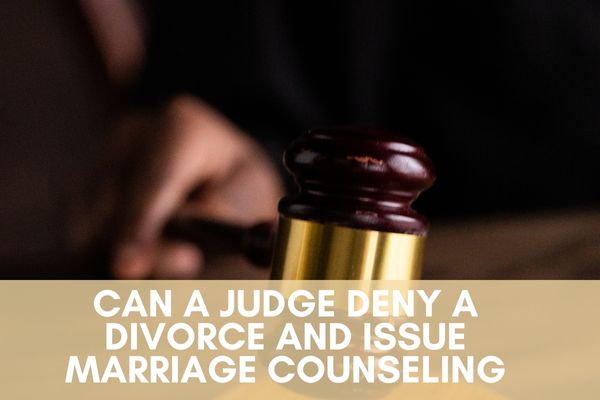The question”Can a judge deny a divorce and issue marriage counseling” is often asked when getting a divorce is forced onto someone who does not desire one, but they can be made to sit in a therapist’s office.
Most therapists admit that healing a dysfunctional marriage is challenging even when both partners actively attend counseling.vThe judge presiding over the case has a considerable degree of discretion when couples files for divorce.
In some cases, the judge might decide that the marriage is salvageable and mandate that both parties go to counseling. Can the judge make one party attend counseling even when they don’t want to? The reply is, perhaps.
Can A Judge Deny a Divorce And Issue Marriage Counseling
Generally speaking, courts cannot compel people to act against their will. There are a few exceptions to this rule, though. Judges have a lot of discretion when choosing what is best for the parties involved in divorce disputes.
A judge may require the parties to attend sessions together if they think counseling could salvage their marriage. Of course, there is no assurance that the judge will compel one side to attend counseling if they choose not to.
A judge cannot argue against a divorce since the husband and wife are at odds. But requiring couples to attend marriage therapy won’t be sufficient to salvage the union.

Is Marriage Counseling Mandatory Before Divorce?
Without serious effort from both parties, marriage counseling is rarely successful. A court order requiring couples to undergo marriage counseling frequently wastes time and resources. There are regulations in particular states that mandate parenting classes or counseling for different reasons.
For instance, if one party asks for marital therapy or if a judge determines that there is a chance of mending fences.
The courts may decide to impose it as a requirement in these situations. It is conceivable that couples who want to get a divorce can do so without having to attend marriage therapy.
Seeing a marriage counselor has several benefits. People need to be more aware of the value of an impartial third party for an uneasy partnership.
It is simple to become engrossed in our narratives and view the situation from our point of view. A marriage therapist might provide a new viewpoint.
One of the key benefits of marriage counseling is this. The idea is to get outside yourself and consider the marriage from multiple angles. You can choose whether a divorce is your sole option or if a reconciliation is conceivable.
A marriage counselor can also provide you with consolation and support. A marriage therapist can identify your issues and give you a sense of empathy. Above all else, a marriage counselor may provide wisdom to you.
In most cases, it is mandatory to issue marriage counseling as this might help the couple to realize the little mistake they made but then saw as nothing.
If the couple realizes their mistake, this will go a long way, as the counseling will help save the marriage and restore peace in such homes.
Courts can order partners to go to marriage counseling before finalizing a divorce, though this rarely happens.
In most states, a judge may order it if he thinks there is a potential for reconciliation. Some states require it if one partner asks for it, and others allow the Court to determine whether to grant the request.
You must attend marriage therapy, precisely what it sounds like, at the judge’s direction before the Court will grant you a divorce. Meetings are typically comparable to any marriage counseling to try and keep your union together.
Even though a court may order it independently, the respondent, the partner who did not file, usually asks for it to keep the marriage intact. Before getting a divorce is one of the most challenging conversations a couple can have; this is where marriage counseling comes in.
Sometimes this can be very difficult as the couple involved in the case will see this as a situation to bring in all the wrongdoing the other must have done; for a judge to be able to give out counseling effectively, he should have private counseling with them one after another to be able to control the situation at hand and also to be able to issue out a positive result from the case.

What States Require Marriage Counseling Before Divorce
Many states have “reconciliation therapy” legislation to save the marriage before a divorce is finalized.
If minor children are involved or the opposing party contests that the marriage is irretrievably shattered, Florida courts, for instance, have the authority to halt divorce proceedings for three months.
Both parties work with a professionally skilled reconciliation attorney during this time to resolve disagreements and”repair” the marriage.
Reconciliation efforts may lessen the sorrow of divorce even if a marriage cannot be repaired.
Suppose the parties have been legally separated for a certain amount of time, frequently one to two years, and satisfy the fundamental eligibility requirements. In that case, most state courts will automatically grant a divorce order.
In most places, what makes the requirement of marriage counseling before a divorce could be that one person is not entirely okay with the case at hand, maybe because of the love or care the person has for the other, so in such cases, the judge will not just grant the divorce like that, the judge has to see through the other person’s opinion and by so doing the judge will give counseling to avoid later regret by any of them.
Sometimes not only because of the state of the other person but because of the age or the psychological effect of divorce on children; at this point, the judge will instead give counseling than a divorce to help save the children involved in such cases.
A “no-fault” divorce may be obtained in any state, often referred to as “irretrievable breakdown” or “irreconcilable differences.” A no-fault divorce is one in which neither party is solely responsible for the breakdown of the marriage, as opposed to cases where one of the parties had an affair or otherwise violated the terms of the wedding.
Other grounds for divorce are based on the assumption that one of the parties is at fault. State laws differ, but most states allow parties to file for an “at-fault” divorce if the other party:
Any state may provide a “no-fault” divorce, often known as an “irretrievable breakdown” or an “irreconcilable differences” divorce.
Contrary to situations when one party had an affair or otherwise broke the rules of the marriage, a no-fault divorce occurs when neither party is entirely to blame for the union’s dissolution.
The presumption that one of the parties is at blame underlies other grounds for divorce.
Though state laws vary, most states permit parties to request an “at-fault” divorce if the other party:
Adultery, abandonment, fraud, cruelty, imprisonment, a conviction for a felony, living apart, and other reasons may all be used to obtain a divorce in Oklahoma.
However, most divorces are issued without regard to fault, indicating no realistic chance of the marriage being saved.
Oklahoma does not have a law requiring couples to attend marital counseling, but I would still strongly advise you to do so.
If the other person doesn’t go to counseling, you might want to think about counseling alone to help you work through the challenging emotional difficulties.
Before the Court accepts your divorce, you must complete the co-parenting course if minor children are involved.
Suppose the opposite party vehemently objects to forced mediation or counseling for the spouses. In that case, a judge may conclude that there is a potential for reconciliation, but, in practice, such requests are rarely granted.
In Kansas, there are two grounds for divorce that a person may choose from:
One is based on the spouses’ incompatibility, and the other is on the spouses’ failure to fulfill a significant marital responsibility or obligation.
The most typical foundation or justification for filing for divorce is the incompatibility of the couples.
Although the word”incompatibility” may signify different things to different people, the claim ultimately means that there is little chance that the marriage can survive.
In summary, it is not essential to establish blame for the breakdown of the marriage on the part of either party to obtain a divorce that the Court has approved.
Final thought
Before a divorce, it is required that marriage counseling is observed to give the couple a chance to work on their marriage.
Although this counseling is not a determinant to fix things, many couples at this stage discover their errors and take a total round to end the divorce process.
Suppose the counseling fails, the Court can not force both partners to stay married. And would have to grant their plea by the law.
As long as both parties are happy with their choices, then the Court has no say.



